
SCARS Institute’s Encyclopedia of Scams™ Published Continuously for 25 Years

How To Know If You Are In Scam or Recovery Denial?
Psychology of Scams
A SCARS Insight
How to Know if I’m in Denial About Your Scam?
Waking up day in and day out afraid or angry or refusing to deal with the reality in front of you isn’t a way to be happy.
Neither is trying to ignore what happened to you!
The tendency to dismiss mounting negative consequences from the trauma of your scam starts to take on a life of its own, with even more dire results. These signs of denial about what happened to you and the trauma that comes from not properly addressing it are worth being aware of.
Understanding the Dynamics of Denial About Your Scam
Whether someone you love is in denial or you’re the one in denial, there’s no question that the situation isn’t anything to dismiss or ignore. Scams are traumatic!
It could be that the signs of denial were a normal part of your life before the scam all along and gradually took on the semblance of normalcy. Symptoms of denial aren’t always familiar enough to raise any immediate concern. Yet denial and scams go hand in hand, and it’s common to experience a relationship scam (whatever the form) and the corresponding denial in some form or at some level.
If it is a case of denial, what signs should someone look for? Is there a test that can be applied, for example, if a loved one, family member, or even you appears to display symptoms of denial—especially related to the need to take action after the scam, such as reporting to law enforcement or asking for help?
Where Is the Line Drawn? No Longer Deniable
After months or years of denial that a problem exists, negative consequences accumulate and accelerate to a point of nearly irreversible personal decline. There’s no longer any shred of deniability that a problem exists. The people around you can see it. So can you if you’re being honest with yourself.
When this point of no return occurs, it is often up to the loved ones and family members to insist that the individual accept help and get treatment if the individual refuses to do so. Unfortunately, this can also result in complete withdrawal.
It may very well be that by this time the person secretly wants to be encouraged to accept professional treatment or support since self-efforts to remedy the problem have not succeeded. Professional intervention may be required, and even recommended before the road to real recovery can begin.
What Is Denial?
In essence, denial is a case of saying it isn’t so or it can also be wishing it isn’t so.
Despite the reality that may be apparent to others, denial frequently happens when someone can’t or won’t face what they know deep inside to be true.
This is particularly common in those who are confronted with situations that are painful and traumatic, such as scams, gambling, addictions, abusive relationships, and so many more.
When It Helps, When It Hurts
Denial is a coping mechanism that gives you time to adjust to distressing situations — but staying in denial can interfere with your recovery after a scam or your ability to tackle challenges of daily life.
If you’re in denial, you’re trying to protect yourself by refusing to accept the truth about something that’s happening in your life – the scam or possibly, more precisely, the damage it has done to you.
In some cases, initial short-term denial can be a good thing, giving you time to adjust to a painful or stressful issue. Denial is a normal part of the grieving process that everyone has to go through to heal. It might also be a precursor to making some sort of a change in your life. But denial has a dark side.
Understanding Denial And Its Purpose
Refusing to acknowledge that something is wrong is a way of coping with emotional conflict, stress, painful thoughts, threatening information and anxiety. You can be in denial about anything that makes you feel vulnerable or threatens your sense of control, such as an illness, addiction, eating disorder, personal violence, financial problems or relationship conflicts, and especially victimization. You can be in denial about something happening to you or to someone else.
When you’re in denial, you:
- Won’t acknowledge a difficult situation
- Try not to face the facts of a problem
- Downplay possible consequences of the issue
When Denial Can Be Helpful
Refusing to face facts might seem unhealthy. Sometimes, though, a short period of denial can be helpful. Being in denial gives your mind the opportunity to unconsciously absorb shocking or distressing information at a pace that won’t send you into a psychological tailspin.
For example, after a traumatic event, you might need several days or weeks to process what’s happened and come to grips with the challenges ahead. You have been scammed, so you already know what the triggering event was. You might feel a rush of fear and adrenaline as you think about it.
So you the scam as much as you can, hoping it’ll go away on its own.
This type of denial is a helpful response to stressful information. You initially denied the distressing problem. But as your mind absorbed the possibility, you began to approach the problem more rationally and took action by seeking help. That is helpful!
When Denial Can Be Harmful
But what if you had continued to be in denial about the scam and the trauma it caused? What if you never sought help? If denial persists and prevents you from taking appropriate action, such as consulting a victims’ assistance provider or a counselor, it’s a harmful response.
In situations such as these, denial might prevent you or your loved one from getting help, such as recovery support or counseling, or dealing with problems that can spiral out of control — all with potentially devastating long-term consequences.
What Are the Signs of Denial?
What many people who live with or are regularly around those who are in denial may see, yet many times refuse to acknowledge exists, are several telling signs and symptoms of denial, especially scam denial. Outsiders may be quicker to recognize these symptoms of denial. That said, even those who are fairly knowledgeable about the psychology of scams sometimes have difficulty separating occasional telltale signs of denial from an individual’s normal character or behavior.
Classic Signs Of Denial Include:
- Refusal to talk about the scam or their need for help, especially with loved ones but also with friends, co-workers, and others.
- Lying about the scam, their involvement in it, including financial expenditures related to the scam. Such as hiding their continued contact with the scammer.
- The insistence that they are in control of what they do – both online and in real life – both during and after the scam, or that their attitudes and perceptions or behavior are normal.
- Comparing one’s actions to those of others. Bother to justify them or to avoid something.
- The rationalization that everything is under control, that they are just fine.
- Constantly making excuses for their emotions, such as anger. They have a right to be angry, hate, or want vengeance, even when it is getting in the way of their real relationships and happiness.
- Blaming others for their problems. No one does anything – the police, the government, etc. Of course, the only one to blame is the scammer!
- Not caring about the consequences of their actions, including not caring about their recovery – both as apathy and wilfully disregard (for themselves and for others – a lack of empathy.)
- Not caring about others similarly affected – are unable to show empathy for other scam victims. They just want justice or vengeance.
- Making insincere promises to improve participation in their recovery and change their behavior.
- Alternating bouts of sadness and anger. Especially directed at those they disagree with.
- Being adamant about living life on their terms and remaining totally in control – even though their actions and emotions tell a far different story.
If you’re wondering if you’re in denial, consider the following questions:
- Do I refuse to accept criticism and well-meaning comments from others who tell me they want to help?
- Do I get upset when someone shares information that contradicts what I believe?
- Am I so stubborn that I can’t see how my life is deteriorating around me because of my scam?
- Am I worried about the shame or stigma associated with the scam and, therefore, afraid to seek or accept help?
- How many times have I experienced panic attacks, paralysis, or other trauma symptoms but do not want to face them?
- Have I ever lost a job or been reprimanded due to attitude after the scam ended?
- Am I being overlooked for promotion because I can’t be relied upon to complete my responsibilities?
- Have I lost time for unexplained “illnesses” when I was really in no fit state to even talk to anyone and too many absences from the job?
- Is my family negatively affected by my scam and my behavior after it ended?
- Have I lost control with my loved ones as a result of my shame and guilt, lashing out to them potentially with emotional violence or verbal abuse?
- Have I tried and failed to kill myself, or wanted to do it?
- Have I given up on long-held goals or personal dreams because I’m stuck in the cycle of emotional exhaustion?
- Is there a family history of addiction, trauma or a mental health disorder that might make it hard for me to recognize the signs and symptoms in myself?
- Do I no longer care about keeping promises I’ve made to my loved ones?
- Do I really want to get help to manage the depression, anxiety, or trauma that’s wreaking havoc on my life but never seem to actually do it
If you answered yes to any of these then you may be in denial!
How to Overcome Denial
Symptoms of denial may become so self-evident that the individual displaying them decides to face up to the truth and get help to overcome the problem of their scam recovery or the difficulty living life with the associated trauma or mental health disorder. On the other hand, denial may be so embedded that the scam victim can’t recognize, let alone acknowledge, that they have a problem and need help to overcome it.
Nevertheless, professional victims’ assistance and support, trauma counseling, treatments, and therapies can address the denial that accompanies being a scam victim, as well as get at the root causes for such issues. Then, continuing counseling and treatment, plus ongoing support & education from professionals and peers can help ensure forward momentum in recovery.
Having a heartfelt conversation or series of caring discussions about your situation and the sincere desire to overcome this weight can go a long way toward getting beyond denial and into real recovery. All it takes is that first step!
Moving Past Denial
When faced with an overwhelming turn of events, it’s OK to say, “I just can’t think about all of this right now.” You might need time to work through what’s happened and adapt to new circumstances. But it’s important to realize that denial should only be a temporary measure — it won’t change the reality of the situation.
It isn’t always easy to tell if denial is holding you back. The strength of denial can change over time as it turns into deeper trauma— some periods are linked to less defensiveness, and at other times denial may be much stronger. If you feel stuck or if someone you trust suggests that you’re in denial, however, you might try these strategies:
- Honestly examine what you fear – the scam is over, so what is holding you back now?
- Think about the potential negative consequences on your life and family of not taking action?
- Allow yourself to express your fears and emotions – but understand that it is all about balance!
- Try to identify irrational beliefs about your situation – learn about your reality, your situation, what caused this, why this happened to you, and what you can do about it.
- Journal about your daily experience (SCARS publishes a journal specifically designed for scam victims or you can use your own – just make sure you do it).
Open up to a trusted friend or loved one.
Participate in a support group.
If you can’t make progress dealing with a stressful situation on your own — you’re stuck in the denial phase — consider talking to a professional support provider or mental health provider. They can help you find healthy ways to cope with the situation rather than trying to pretend it doesn’t exist.
When A Loved One Or Friend Needs Help Moving Beyond Denial
You might find it frustrating when someone you love or a friend is in denial about an important issue. But before demanding that your loved one or friend face the facts, take a step back. Try to determine if he or she just needs a little more time to work through the issue.
At the same time, let the person know that you’re open to talking about the subject, even if it makes both of you uncomfortable. Ultimately, this might give your loved one or friend the security he or she needs to move forward. Your loved one or friend may even be relieved when you bring the issue up.
If your loved one is in denial about serious emotional or mental health issues, such as depression, addictive behaviors, or other issues, broaching the issue might be especially difficult. Listen and offer your support. Don’t try to force someone to seek treatment, or support which could lead to angry confrontations. Offer to meet together with a doctor or mental health provider, or help them participate in a support group. SCARS Support Groups do allow family and friends to participate in specific situations. However, recognize that your active participation can have the opposite effect – that embarrassment or shame can get in the way.
Recovery Fear
Overcoming fear about what treatment or support for victimization and mental health disorders entails is a huge hurdle for anyone who wants or needs help to overcome them. The perceived stigma that surrounds victimization is also an obstacle, as they’re among the most stigmatized psychiatric conditions. But having a victim trauma or mental illness is not indicative of a character flaw or that the person is somehow less worthy or capable than anyone else.
Trauma does require professional help to overcome and learn to manage symptoms and how to live in recovery. This is true not only for the individual who has the trauma but also for the family members who want the best for their loved ones and themselves.
SCARS is a professional and award-winning crime victims’ assistance organization dedicated to helping scam victims worldwide. Our team has been helping to educate scam victims about the dangers of scams and helping them to recover for 30 years! No victim has anything to fear from recovery and support.
It is not easy, and in fact, it may be the most difficult thing they have ever faced, but recovery is possible for almost everyone if they will allow it.
Summary
If the signs of denial are recognizable, make the decision today to get help to overcome your scam by contacting us for free, discreet, confidential, and comprehensive answers to your questions about what we can do to help. Don’t allow fear to stand in the way of taking proactive steps toward healing recovery. We are here to help and we are experts in the field of scam victimization, support, and recovery.
You can contact us by email at Support@AgainstScams.org or jump into one of our support groups, such as this one: Scam Victims’ Support Group : SCARS Official Group | Facebook
Whatever you decide, get the help you need and deserve!
DO NOT SUFFER IN SILENCE!
-/ 30 /-
What do you think about this?
Please share your thoughts in a comment below!
Table of Contents
- Psychology of Scams
- Waking up day in and day out afraid or angry or refusing to deal with the reality in front of you isn’t a way to be happy.
- Understanding the Dynamics of Denial About Your Scam
- Where Is the Line Drawn? No Longer Deniable
- In essence, denial is a case of saying it isn’t so or it can also be wishing it isn’t so.
- Understanding Denial And Its Purpose
- When Denial Can Be Helpful
- When Denial Can Be Harmful
- What Are the Signs of Denial?
- Classic Signs Of Denial Include:
- Moving Past Denial
- When A Loved One Or Friend Needs Help Moving Beyond Denial
- Whatever you decide, get the help you need and deserve!
- DO NOT SUFFER IN SILENCE!
LEAVE A COMMENT?
Thank you for your comment. You may receive an email to follow up. We never share your data with marketers.
Recent Comments
On Other Articles
- on Love Bombing And How Romance Scam Victims Are Forced To Feel: “I was love bombed to the point that I would do just about anything for the scammer(s). I was told…” Feb 11, 14:24
- on Dani Daniels (Kira Lee Orsag): Another Scammer’s Favorite: “You provide a valuable service! I wish more people knew about it!” Feb 10, 15:05
- on Danielle Delaunay/Danielle Genevieve – Stolen Identity/Stolen Photos – Impersonation Victim UPDATED 2024: “We highly recommend that you simply turn away form the scam and scammers, and focus on the development of a…” Feb 4, 19:47
- on The Art Of Deception: The Fundamental Principals Of Successful Deceptions – 2024: “I experienced many of the deceptive tactics that romance scammers use. I was told various stories of hardship and why…” Feb 4, 15:27
- on Danielle Delaunay/Danielle Genevieve – Stolen Identity/Stolen Photos – Impersonation Victim UPDATED 2024: “Yes, I’m in that exact situation also. “Danielle” has seriously scammed me for 3 years now. “She” (he) doesn’t know…” Feb 4, 14:58
- on An Essay on Justice and Money Recovery – 2026: “you are so right I accidentally clicked on online justice I signed an agreement for 12k upfront but cd only…” Feb 3, 08:16
- on The SCARS Institute Top 50 Celebrity Impersonation Scams – 2025: “Quora has had visits from scammers pretending to be Keanu Reeves and Paul McCartney in 2025 and 2026.” Jan 27, 17:45
- on Scam Victims Should Limit Their Exposure To Scam News & Scammer Photos: “I used to look at scammers photos all the time; however, I don’t feel the need to do it anymore.…” Jan 26, 23:19
- on After A Scam, No One Can Tell You How You Will React: “This article was very informative, my scams happened 5 years ago; however, l do remember several of those emotions and/or…” Jan 23, 17:17
- on Situational Awareness and How Trauma Makes Scam Victims Less Safe – 2024: “I need to be more observant and I am practicing situational awareness. I’m saving this article to remind me of…” Jan 21, 22:55
ARTICLE META
Important Information for New Scam Victims
- Please visit www.ScamVictimsSupport.org – a SCARS Website for New Scam Victims & Sextortion Victims
- Enroll in FREE SCARS Scam Survivor’s School now at www.SCARSeducation.org
- Please visit www.ScamPsychology.org – to more fully understand the psychological concepts involved in scams and scam victim recovery
If you are looking for local trauma counselors please visit counseling.AgainstScams.org or join SCARS for our counseling/therapy benefit: membership.AgainstScams.org
If you need to speak with someone now, you can dial 988 or find phone numbers for crisis hotlines all around the world here: www.opencounseling.com/suicide-hotlines
A Note About Labeling!
We often use the term ‘scam victim’ in our articles, but this is a convenience to help those searching for information in search engines like Google. It is just a convenience and has no deeper meaning. If you have come through such an experience, YOU are a Survivor! It was not your fault. You are not alone! Axios!
A Question of Trust
At the SCARS Institute, we invite you to do your own research on the topics we speak about and publish, Our team investigates the subject being discussed, especially when it comes to understanding the scam victims-survivors experience. You can do Google searches but in many cases, you will have to wade through scientific papers and studies. However, remember that biases and perspectives matter and influence the outcome. Regardless, we encourage you to explore these topics as thoroughly as you can for your own awareness.
Statement About Victim Blaming
SCARS Institute articles examine different aspects of the scam victim experience, as well as those who may have been secondary victims. This work focuses on understanding victimization through the science of victimology, including common psychological and behavioral responses. The purpose is to help victims and survivors understand why these crimes occurred, reduce shame and self-blame, strengthen recovery programs and victim opportunities, and lower the risk of future victimization.
At times, these discussions may sound uncomfortable, overwhelming, or may be mistaken for blame. They are not. Scam victims are never blamed. Our goal is to explain the mechanisms of deception and the human responses that scammers exploit, and the processes that occur after the scam ends, so victims can better understand what happened to them and why it felt convincing at the time, and what the path looks like going forward.
Articles that address the psychology, neurology, physiology, and other characteristics of scams and the victim experience recognize that all people share cognitive and emotional traits that can be manipulated under the right conditions. These characteristics are not flaws. They are normal human functions that criminals deliberately exploit. Victims typically have little awareness of these mechanisms while a scam is unfolding and a very limited ability to control them. Awareness often comes only after the harm has occurred.
By explaining these processes, these articles help victims make sense of their experiences, understand common post-scam reactions, and identify ways to protect themselves moving forward. This knowledge supports recovery by replacing confusion and self-blame with clarity, context, and self-compassion.
Additional educational material on these topics is available at ScamPsychology.org – ScamsNOW.com and other SCARS Institute websites.
Psychology Disclaimer:
All articles about psychology and the human brain on this website are for information & education only
The information provided in this article is intended for educational and self-help purposes only and should not be construed as a substitute for professional therapy or counseling.
While any self-help techniques outlined herein may be beneficial for scam victims seeking to recover from their experience and move towards recovery, it is important to consult with a qualified mental health professional before initiating any course of action. Each individual’s experience and needs are unique, and what works for one person may not be suitable for another.
Additionally, any approach may not be appropriate for individuals with certain pre-existing mental health conditions or trauma histories. It is advisable to seek guidance from a licensed therapist or counselor who can provide personalized support, guidance, and treatment tailored to your specific needs.
If you are experiencing significant distress or emotional difficulties related to a scam or other traumatic event, please consult your doctor or mental health provider for appropriate care and support.
Also read our SCARS Institute Statement about Professional Care for Scam Victims – click here to go to our ScamsNOW.com website.


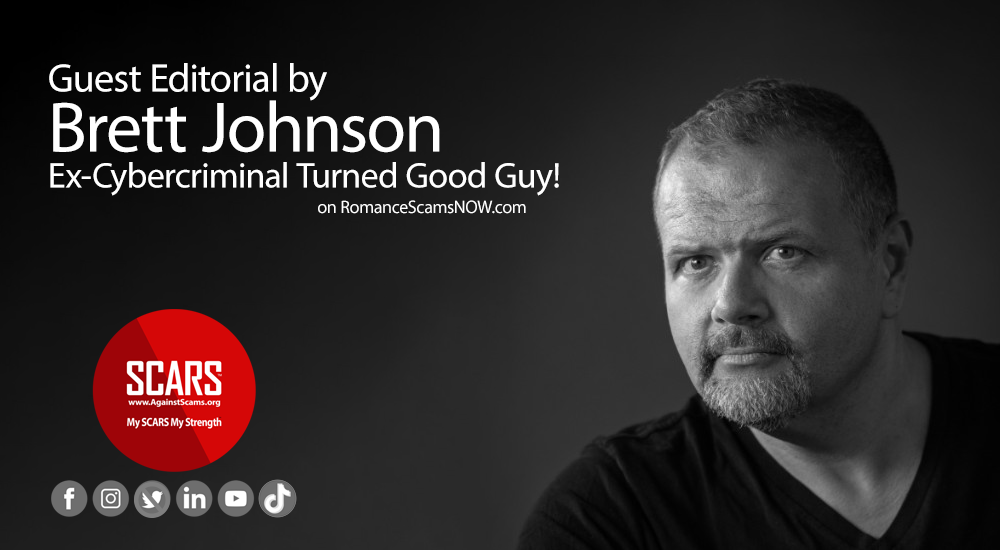
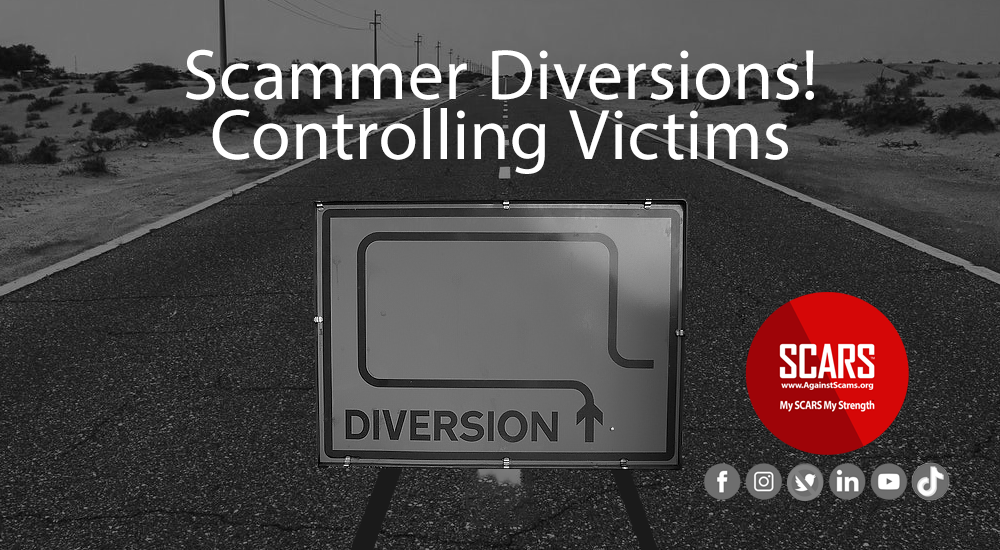
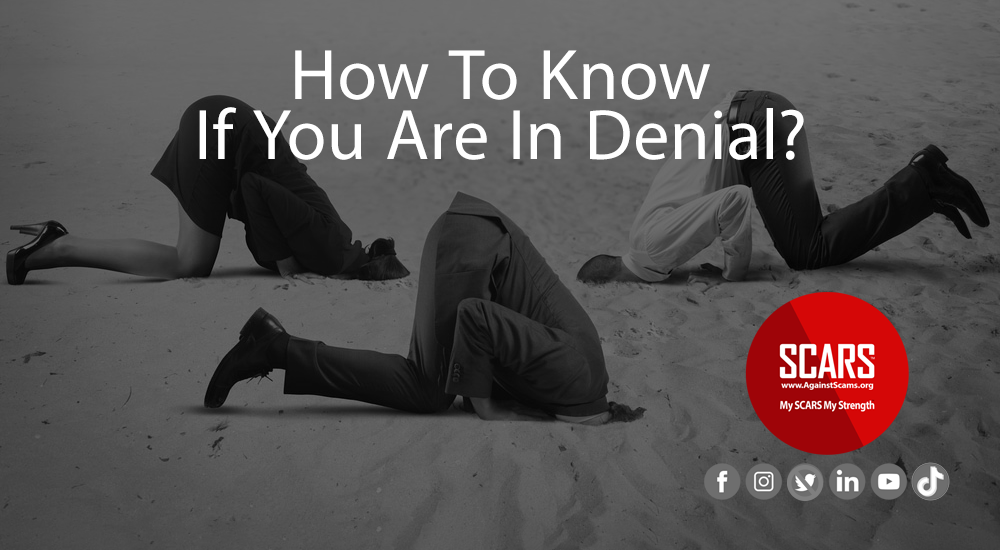


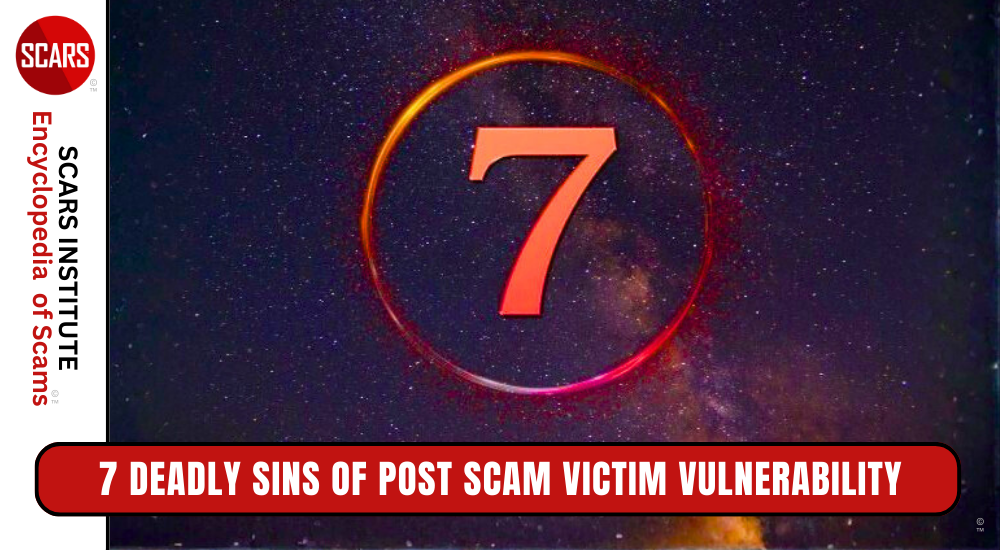
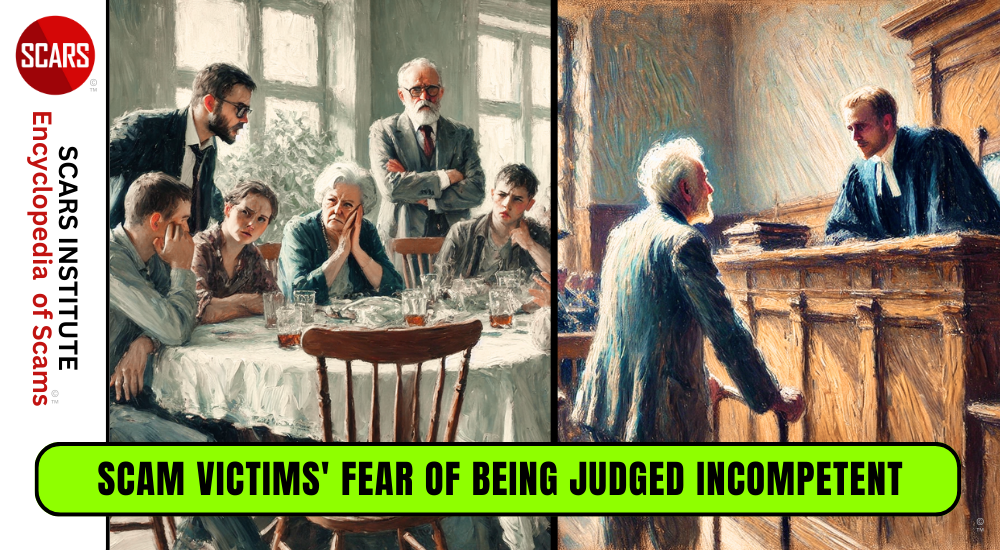
![Financial Recovery - Avoid Money Triggers - Perspective on Money for Scam Victims - 2023 [UPDATED 2025] Financial Recovery Money Triggers Financial Recovery - Avoid Money Triggers - Perspective on Money for Scam Victims - 2023 [UPDAYED 2025] - on the SCARS Institute RomanceScamsNOW.com - the Encyclopedia of Scams™](https://romancescamsnow.com/wp-content/uploads/2025/06/Financial-Recovery-Money-Triggers.png)
![Why People Blame Scam Victims? Stop Scam Victim Blaming - [UPDATED 2025] Why People Blame Scam Victims 2025 Why People Blame Scam Victims? Stop Scam Victim Blaming - [UPDATED 2025] - on the SCARS Institute RomanceScamsNOW.com - the Encyclopedia of Scams™](https://romancescamsnow.com/wp-content/uploads/2021/11/Why-People-Blame-Scam-Victims-2025.png)
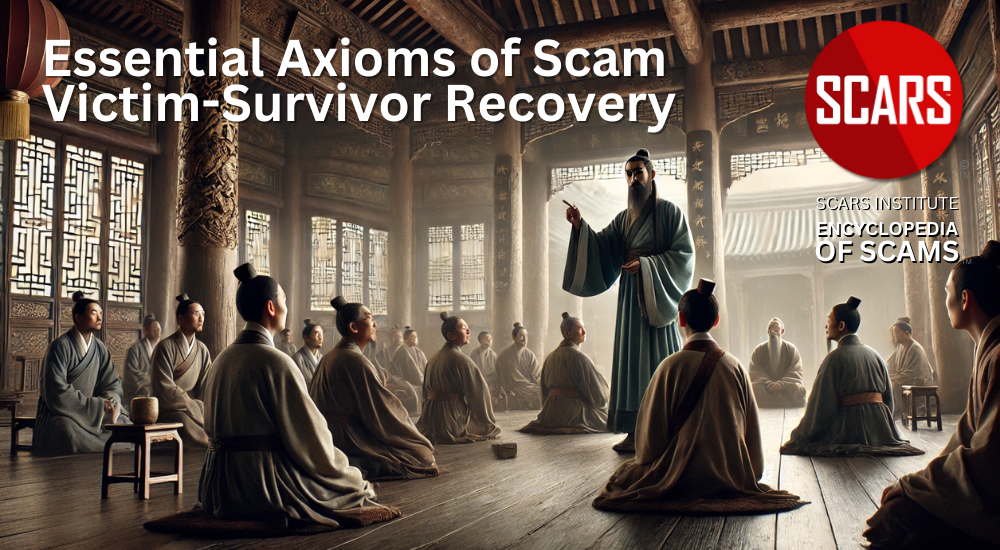




At times I live with the temporary measure of denial – when things are happening too fast for me to process, when I am afraid to face the situation. I have not been one to use denial as a regular tool. I have met people who are in a denial state and have been very uncomfortable around them. I was brought up to face fears head on, to acknowledge the harshest critic and the worst mistake. Having that strength to admit an error to my management, to swallow my inadequacy and take steps to follow through on these situations has enabled me to learn and grow.
Very useful information not just for us as crime victims but also to support those we care about.
For me denial can take on many facets. I experienced a few iterations of my own denial/no denial in order to root out the all the internal turmoil I suffered. Acceptance of all the facets of my scam allowed me to move forward with my recovery.
Denial started for me during the scam and lasted until I learned enough to know how I was scammed and accepted that I was just another crime victim.
Excellent article about denial. I never imagined that a short term denial term existed and that it could be good. It makes sense, after reading this article, giving oneself time to adjust to a painful distressing situation.